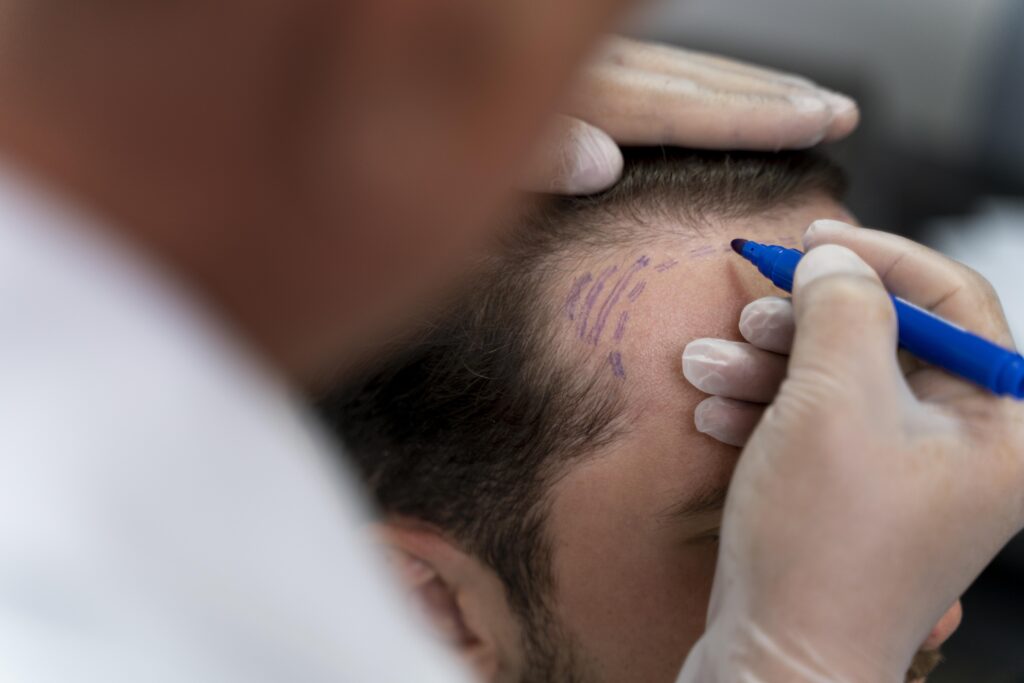Thinking about a chest hair transplant but unsure what to expect? This procedure offers a solution for men seeking a fuller, more masculine chest through precise hair restoration techniques.
In this post, you’ll discover how the procedure works, what recovery looks like, and how to ensure long-lasting results.
Whether you’re researching options or planning your next step, this guide delivers expert insights, timelines, and practical advice — all backed by medical expertise and patient experience.
What Is a Chest Hair Transplant?
A chest hair transplant is a cosmetic surgical procedure that involves transplanting hair from another part of the body — typically the scalp or beard — to the chest area.
It’s ideal for men who naturally lack chest hair or want to improve hair density for a more rugged, masculine look.
How the Procedure Works
Hair follicles are extracted using the Follicular Unit Extraction (FUE) or Follicular Unit Transplantation (FUT) technique.
The grafts are then strategically implanted into the chest to mimic natural growth patterns.
Types of Hair Used for Transplant
- Scalp hair is the most common donor source.
- Beard hair may also be used for thicker, coarser texture.
- In some cases, body hair from the arms or legs can be considered.
Who Is an Ideal Candidate?
You may be a good candidate if:
- You’re in good overall health.
- You have sufficient donor hair.
- You want to fill in patches or enhance overall chest hair density.
- You have realistic expectations.

Benefits of a Chest Hair Transplant
Aesthetic Enhancement & Masculine Appearance
A fuller chest gives a more traditionally masculine look, aligning with many individuals’ grooming goals.
Improved Confidence & Body Image
Feeling good about your body can positively impact self-esteem and comfort in social or intimate settings.
Customizable Hair Patterns
Patients can choose the density and shape of the transplanted hair, making the outcome highly personal and natural-looking.
Chest Hair Transplant Procedure Step-by-Step
Pre-Surgery Consultation & Planning
- Scalp and chest assessment
- Discuss goals and expectations
- Review medical history
FUE vs FUT Methods
- FUE: Individual follicles removed, minimal scarring, faster healing
- FUT: Strip of skin removed, may be better for large graft numbers
Pro Tip: Most chest hair transplants use the FUE method for its precision and reduced downtime.
Duration, Anesthesia, and Cost Overview
- Procedure takes 3–6 hours on average.
- Local anesthesia is commonly used.
- Cost varies by clinic, typically between $2,500–$6,000 depending on graft number.

Recovery Timeline and Aftercare Tips
Initial Healing Phase (First 3–7 Days)
- Mild swelling and redness are normal.
- Tiny scabs form and fall off within a week.
- Avoid tight clothing and sleeping on your chest.
When to Expect Full Results
- 2–4 weeks: Transplanted hairs may shed (normal).
- 3 months: New growth begins.
- 6–12 months: Final results visible.
Do’s and Don’ts After the Procedure
Do:
- Follow all aftercare instructions.
- Use prescribed topical treatments if given.
- Keep area clean and dry.
Don’t:
- Rub or scratch the area.
- Expose the chest to direct sunlight for 2 weeks.
- Resume gym or strenuous activity too soon.
When Can I Exercise Again After a Chest Hair Transplant?
Why Is Sweating Bad After a Hair Transplant?
Sweating can introduce bacteria and increase infection risk. It also irritates the healing grafts, possibly leading to poor hair retention.
How Long Should I Avoid Sweating or Heavy Activity?
Avoid:
- Heavy workouts for at least 10–14 days
- Saunas, hot tubs, or swimming for 2–3 weeks
- Running or cardio until cleared by your surgeon
Safe Timeline for Gym, Swimming, and Sauna Use
| Activity | Safe to Resume |
|---|---|
| Walking | 3 days post-op |
| Light cardio | After 2 weeks |
| Weightlifting | After 3 weeks |
| Sauna/Steam | After 4 weeks |
Expert Tips for a Smooth Recovery
Advice from Hair Restoration Surgeons
“The first two weeks are crucial. Keep the area clean, avoid trauma, and stay hydrated,” says Dr. Rana Irfan, a board-certified hair transplant surgeon in Islamabad.
Common Mistakes to Avoid Post-Transplant
- Wearing tight shirts immediately after surgery
- Ignoring scab care
- Applying oils or creams without approval
Nutrition & Skin Care Tips for Better Results
- Eat protein-rich foods to support follicle growth.
- Avoid smoking and alcohol.
- Moisturize with approved products once healing begins.
Real Patient Experiences & Results
Before & After Photos

Lessons Learned from Past Patients
- Be patient — results take time.
- Trust the process and your doctor’s advice.
Risks, Side Effects, and How to Avoid Them
Potential Complications
- Mild infection
- Itching or folliculitis
- Uneven growth if post-care is ignored
How to Choose a Qualified Surgeon
- Look for board certification
- Review past patient results
- Read independent reviews
Signs You Should Contact Your Doctor
- Fever or pus at implant site
- Excessive bleeding
- Prolonged pain or redness

Frequently Asked Questions (FAQs)
How much does a chest hair transplant cost?
It typically ranges from $2,500 to $6,000, depending on the number of grafts and clinic location.
Is chest hair transplant permanent?
Yes. Once the transplanted hair takes root, it grows naturally and permanently.
Can I choose the density or pattern?
Yes. During your consultation, you can design the hairline and density with your surgeon.
Is the procedure painful or uncomfortable?
Local anesthesia ensures minimal discomfort. Post-op soreness usually resolves within a few days.
Ready to Transform Your Look?
If you’re ready to achieve a fuller, natural-looking chest with long-lasting results, book a consultation with Dr. Rana Irfan in Islamabad today.
Our team will guide you through each step — from planning to recovery — with expert care and personalized attention.
👉 consultation with Dr. Rana Irfan in Islamabad today
